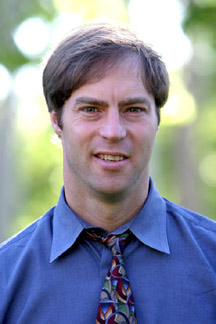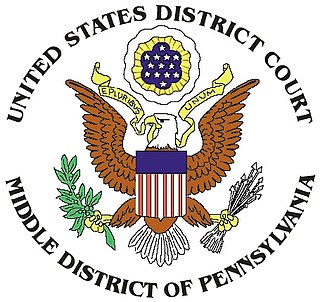Intelligent design (ID) is a pseudoscientific argument for the existence of God, presented by its proponents as "an evidence-based scientific theory about life's origins". Proponents claim that "certain features of the universe and of living things are best explained by an intelligent cause, not an undirected process such as natural selection." ID is a form of creationism that lacks empirical support and offers no testable or tenable hypotheses, and is therefore not science. The leading proponents of ID are associated with the Discovery Institute, a Christian, politically conservative think tank based in the United States.
The Discovery Institute (DI) is a politically conservative think tank, that advocates the pseudoscientific concept of intelligent design (ID). It was founded in 1991 in Seattle as a non-profit offshoot of the Hudson Institute.
Phillip E. Johnson was a UC Berkeley law professor, opponent of evolutionary science, co-founder of the pseudoscientific intelligent design movement, author of the "Wedge strategy" and co-founder of the Discovery Institute's Center for Science and Culture (CSC). He described himself as "in a sense the father of the intelligent design movement". He was a critic of Darwinism, which he described as "fully naturalistic evolution, involving chance mechanisms and natural selection". The wedge strategy aims to change public opinion and scientific consensus, and seeks to convince the scientific community to allow a role for theism, or causes beyond naturalistic explanation, in scientific discourse. Johnson argued that scientists accepted the theory of evolution "before it was rigorously tested, and thereafter used all their authority to convince the public that naturalistic processes are sufficient to produce a human from a bacterium, and a bacterium from a mix of chemicals."

The Center for Science and Culture (CSC), formerly known as the Center for the Renewal of Science and Culture (CRSC), is part of the Discovery Institute (DI), a conservative Christian think tank in the United States. The CSC lobbies for the inclusion of creationism in the form of intelligent design (ID) in public-school science curricula as an explanation for the origins of life and the universe while trying to cast doubt on the theory of evolution. These positions have been rejected by the scientific community, which identifies intelligent design as pseudoscientific neo-creationism, whereas the theory of evolution is overwhelmingly accepted as a matter of scientific consensus.
The intelligent design movement is a neo-creationist religious campaign for broad social, academic and political change to promote and support the pseudoscientific idea of intelligent design (ID), which asserts that "certain features of the universe and of living things are best explained by an intelligent cause, not an undirected process such as natural selection." Its chief activities are a campaign to promote public awareness of this concept, the lobbying of policymakers to include its teaching in high school science classes, and legal action, either to defend such teaching or to remove barriers otherwise preventing it. The movement arose out of the creation science movement in the United States, and is driven by a small group of proponents.

Stephen C. Meyer is an American author and former educator. He is an advocate of the pseudoscience of intelligent design and helped found the Center for Science and Culture (CSC) of the Discovery Institute (DI), which is the main organization behind the intelligent design movement. Before joining the DI, Meyer was a professor at Whitworth College. Meyer is a senior fellow of the DI and director of the CSC.

The Wedge Strategy is a creationist political and social action plan authored by the Discovery Institute, the hub of the pseudoscientific intelligent design movement. The strategy was put forth in a Discovery Institute manifesto known as the Wedge Document. Its goal is to change American culture by shaping public policy to reflect politically conservative fundamentalist evangelical Protestant values. The wedge metaphor is attributed to Phillip E. Johnson and depicts a metal wedge splitting a log.
The "teach the controversy" campaign of the Discovery Institute seeks to promote the pseudoscientific principle of intelligent design as part of its attempts to discredit the teaching of evolution in United States public high school science courses. Scientific organizations point out that the institute claims that there is a scientific controversy where in fact none exists.
The Kansas evolution hearings were a series of hearings held in Topeka, Kansas, United States from May 5 to 12, 2005 by the Kansas State Board of Education and its State Board Science Hearing Committee to change how evolution and the origin of life would be taught in the state's public high school science classes. The hearings were arranged by the Board of Education with the intent of introducing intelligent design into science classes via the Teach the Controversy method.

Kitzmiller v. Dover Area School District, 400 F. Supp. 2d 707 was the first direct challenge brought in the United States federal courts testing a public school district policy that required the teaching of intelligent design (ID), ultimately found by the court to not be science. In October 2004, the Dover Area School District of York County, Pennsylvania, changed its biology teaching curriculum to require that intelligent design be presented as an alternative to evolution theory, and that Of Pandas and People, a textbook advocating intelligent design, was to be used as a reference book. The prominence of this textbook during the trial was such that the case is sometimes referred to as the Dover Panda Trial, a name which recalls the popular name of the Scopes Monkey Trial in Tennessee, 80 years earlier. The plaintiffs successfully argued that intelligent design is a form of creationism, and that the school board policy violated the Establishment Clause of the First Amendment to the United States Constitution. The judge's decision sparked considerable response from both supporters and critics.
The Sternberg peer review controversy concerns the conflict arising from the publication of an article supporting pseudoscientific intelligent design creationism in a scientific journal, and the subsequent questions of whether proper editorial procedures had been followed and whether it was properly peer reviewed.
The intelligent design movement has conducted an organized campaign largely in the United States that promotes a pseudoscientific, neo-creationist religious agenda calling for broad social, academic and political changes centering on intelligent design.
"A Scientific Dissent from Darwinism" was a statement issued in 2001 by the Discovery Institute, a Christian, conservative think tank based in Seattle, Washington, U.S., best known for its promotion of the pseudoscientific principle of intelligent design. As part of the Discovery Institute's Teach the Controversy campaign, the statement expresses skepticism about the ability of random mutations and natural selection to account for the complexity of life, and encourages careful examination of the evidence for "Darwinism", a term intelligent design proponents use to refer to evolution.
The Discovery Institute has conducted a series of related public relations campaigns which seek to promote intelligent design while attempting to discredit evolutionary biology, which the Institute terms "Darwinism". The Discovery Institute promotes the pseudoscientific intelligent design movement and is represented by Creative Response Concepts, a public relations firm.

This timeline of intelligent design outlines the major events in the development of intelligent design as presented and promoted by the intelligent design movement.
A number of anti-evolution bills have been introduced in the United States Congress and State legislatures since 2001. Purporting to support academic freedom, supporters have contended that teachers, students, and college professors face intimidation and retaliation when discussing scientific criticisms of evolution, and therefore require protection. Critics of the legislation have pointed out that there are no credible scientific critiques of evolution. An investigation in Florida of the allegations of intimidation and retaliation found no evidence that it had occurred. The vast majority of the bills have been unsuccessful, with the one exception being Louisiana's Louisiana Science Education Act, which was enacted in 2008.
"Strengths and weaknesses of evolution" is a controversial phrase that has been proposed for public school science curricula. Those proposing the phrase, such as the chairman of the Texas State Board of Education (SBOE), Don McLeroy, purport that there are weaknesses in the theory of evolution and in the evidence that life has evolved that should be taught for a balanced treatment of the subject of evolution. The scientific community rejects that any substantive weaknesses exist in the scientific theory, or in the data that it explains, and views the examples that have been given in support of the phrasing as being without merit and long refuted.
The Louisiana Science Education Act, Act 473 (SB733) of 2008 is a controversial anti-evolution law passed by the Louisiana Legislature on June 11, 2008 and signed into law by Governor Bobby Jindal on June 25. The act allows public school teachers to use supplemental materials in the science classroom which are critical of scientific theories such as evolution and global warming and to promote creationism as science. Louisiana was the first state to have passed a law of this type.
In American schools, the Genesis creation narrative was generally taught as the origin of the universe and of life until Darwin's scientific theories became widely accepted. While there was some immediate backlash, organized opposition did not get underway until the Fundamentalist–Modernist controversy broke out following World War I; several states passed laws banning the teaching of evolution while others debated them but did not pass them. The Scopes Trial was the result of a challenge to the law in Tennessee. Scopes lost his case, and further U.S. states passed laws banning the teaching of evolution.





